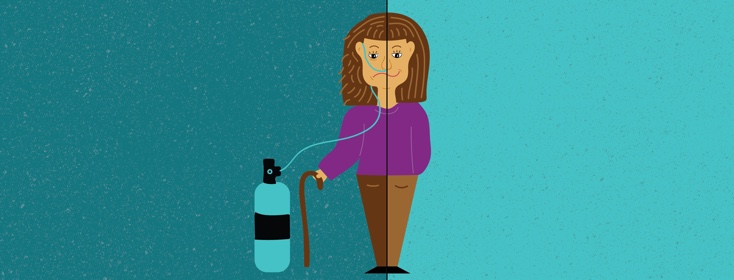Invisible Illness
No, invisible illness isn’t the name of a disease. The term "invisible illness" represents any chronic illness or disease that a person has that is not seen by the human eye. Example: Chronic Obstructive Pulmonary Disease or COPD.
"You don't look sick."
For those with COPD, you probably understand why this falls under Invisible Illness. Maybe you have had people say you don’t look sick. I know it’s happened to me. I’ve been told, “You sound good, so you can’t be sick today.” “You can’t have COPD because you aren’t on oxygen.” How about the look you get when you park in handicapped parking?
I used to get that with my other health issues, too. However, everything is catching up with me. If I am out, people hurry to open doors for me, especially if I am using my cane. At the hospital or doctor’s office, I often get asked if I need a wheelchair.
Now people see my illness
It wasn’t long ago that I had an invisible illness. I guess it isn’t a permanent thing for me anyway. Now people see: If I am moving too fast or too far, I’m probably using my inhaler and doing pursed lip breathing.
This happens if I get sob (short of breath); it seems if anything is going on, I get rosy cheeks; my eyelids can look purplish; if something is triggering allergies, my eyes swell, the right one anyway.
With dizziness, I walk close to the wall or near something I can grab onto. If I am up and about, I will use my cane. I walk with a limp because of arthritis, and if it’s a bad back day, I can’t stand straight.
My husband reminds me to try to straighten my back, which is good. I’m using my walker too. So, my Invisible Illness isn’t very invisible anymore. I prefer having an Invisible Illness. Yet, I remember the frustration when people didn’t believe I was sick or even struggling.
I have talked with so many people who struggle with other people’s reactions to their invisible illnesses. It would be so easy to say ignore them.
You see, it goes beyond that because people can be bullies. They can make nasty comments and actions too speak volumes. Those who struggle with a chronic illness are sometimes prone to depression.
“A chronic illness is an illness that lasts three months or more,” according to the U.S. National Center for Health Statistics. The treatment caused by others can affect a person’s depression and/or anxiety. Depression can be another invisible illness.
What is your invisible illness?
I’m sure that some of you readers can think of an invisible illness that you might have. You with COPD and more, what experiences have you had? Have your family members been persecuted, too? Sadly, we can’t control other people.
This is another reason why a support system can make such a difference. You would likely be talking with others who have experienced similar issues, people who understand and care.
We are here for you, too, and we do understand. We would like to hear about your experiences if you, too, have an Invisible Illness.
What "invisible" part of COPD do you wish other people could see? Tell the community!

Join the conversation